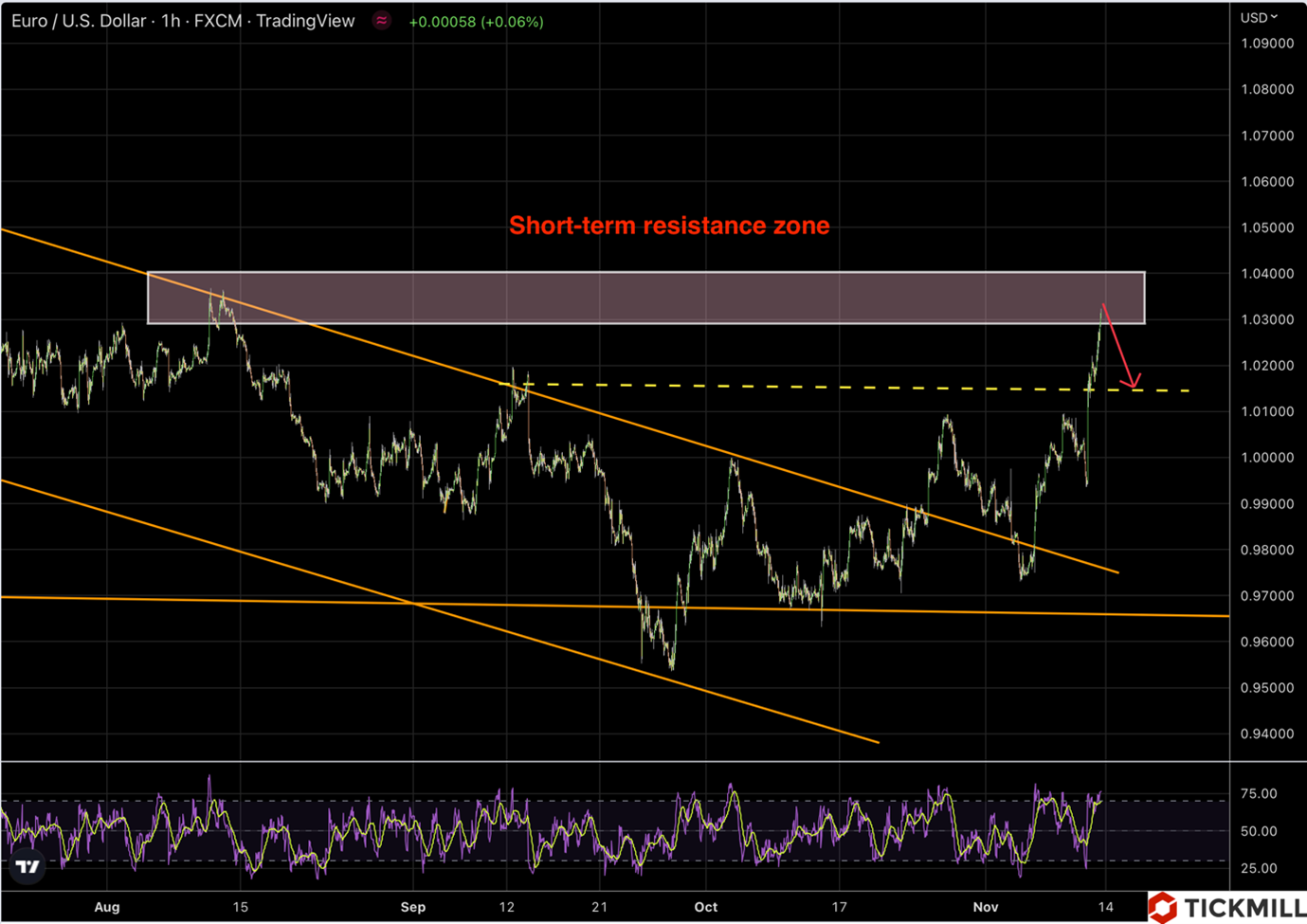It is too Early to Talk about the Dollar Defeat

Investors dumped dollar on Thursday after an unexpected dovish surprise in US inflation and against the backdrop of the easing of covid restrictions in China. Today, the greenback slide continued. Nevertheless, it is still not known how the Fed’s stance has changed after the release of the inflation report, because one month is not enough to claim that US inflation has finally peaked out.
Yesterday’s CPI report dealt a crushing blow to the US currency, which fell about 2% against its peers. The US stock market responded with a rally, with the S&P 500 up 5.5% nearing 4,000 points, the Dow up 3.7% and the Nasdaq tech index jumping 7.5%. Demand for Treasury also rose, the 10-year yield left the 4%+ zone, falling by about 30 basis points, the 2-year yield fell from a high of 4.9% reached in early November to 4.3%. This equates to a terminal Fed rate of around 4.8-4.9%, which means that next year the market expects the Fed to limit itself to one 50 basis point rate hike before ending the tightening cycle.
Now we can expect that the market will be more sensitive to the comments of the Fed officials, as investors will try to assess which of the officials took the October change in inflation as a convincing argument to “put on the brakes.”
The oversold JPY and GBP showed better returns yesterday, while the EUR and CAD rose slightly less. The market also received an additional dose of optimism with the news that China is easing quarantine measures and flight restrictions. The USDCNY is trading below 7.10 for the first time since the beginning of September.
However, it is too early to announce the defeat of the dollar, as the story of inflation has not ended. The strong US labor market continues to generate inflation and the Fed will likely choose to collect more data before preparing the market for what could happen at the December meeting.
Also, there are not so many alternatives to the dollar among the major currencies. The decline in gas prices supported the European currencies, but winter is still ahead and fears of a new energy crisis will likely reemerge soon. In China, despite the easing of covid restrictions, the number of cases is growing, so further easing of sanitary restrictions is a big question. Weak data on China’s foreign trade reminded of the sluggish dynamics of domestic consumer demand and slowdown in demand abroad. Emerging market currencies are also not very attractive yet, given the high borrowing costs of funding currencies (primarily the dollar) and slowdown in global demand.
In general, picking up a well-depreciated dollar, in anticipation of a global recession and volatile appetite to risk, looks very justified. The dollar has probably passed its peak, but it is too early to say that a bear market has begun. In the short term, the dollar index is likely to recover past the 107 level and may test 107.50. For the EURUSD this could mean a rebound from the resistance zone and a correction towards 1.0150:

The focus in the economic calendar today is on the report from the U. Michigan, as well as a speech by FOMC member Williams. Inflation expectations for the year ahead are expected at 5%, for 5 years ahead - at 2.9%. Given the market's focus on inflation data, the surprise on the downside is likely to prompt a positive market reaction - this will be another argument in the piggy bank that the Fed can clearly signal plans to slow down the policy tightening in December. Williams' comments also won't go unnoticed, given that this will be the first speech by a Fed official since the inflation report.
Disclaimer: The material provided is for information purposes only and should not be considered as investment advice. The views, information, or opinions expressed in the text belong solely to the author, and not to the author’s employer, organization, committee or other group or individual or company.
Past performance is not indicative of future results.
High Risk Warning: CFDs are complex instruments and come with a high risk of losing money rapidly due to leverage. 72% and 73% of retail investor accounts lose money when trading CFDs with Tickmill UK Ltd and Tickmill Europe Ltd respectively. You should consider whether you understand how CFDs work and whether you can afford to take the high risk of losing your money.
Futures and Options: Trading futures and options on margin carries a high degree of risk and may result in losses exceeding your initial investment. These products are not suitable for all investors. Ensure you fully understand the risks and take appropriate care to manage your risk.
